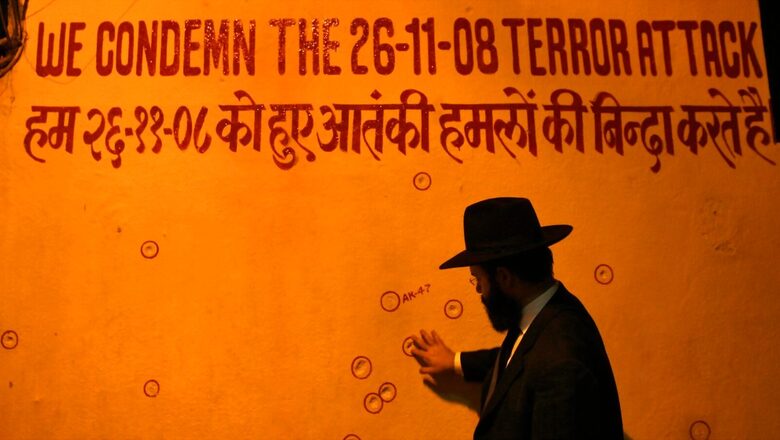
views
The burning dome of Taj Mahal Palace Hotel, blood-stained floors of Chhatrapati Shivaji Maharaj Terminus and two-year-old ‘Baby Moshe’ clinging on to his nanny at Chabad House — 14 years on, these images continue to haunt India and the world.
In one of the worst terror strikes on the country, 10 Pakistani terrorists arrived in Mumbai on November 26, 2008, by sea route and opened fire indiscriminately, killing 166 people — including 18 security personnel — and injuring several others, besides damaging property worth crores.
The attacks that began on November 26 lasted until November 29 with Mumbai’s iconic landmarks — CST, Oberoi Trident, Taj Mahal Palace and Tower, Leopold Cafe, Cama Hospital, Nariman House Jewish community centre — targeted by the terrorists.
Nine of the 10 terrorists were gunned down while the lone terrorist captured alive — Ajmal Kasab — was hanged four years later on November 21, 2012.
As India pays a solemn tribute to those who lost their lives in the attacks, News18 takes a look at the perpetrators and their current situation:
Hafiz Saeed:
Said to the mastermind of the 26/11 attacks, Saeed is the head of Lashkar-e-Taiba and Jamaat-ud-Dawa. In April 2022, Saeed was sentenced to 31 years in jail by an anti-terror court in Pakistan which also ordered that his assets be seized and fined him Rs 3,40,000.
Saeed was also arrested in 2019, right before former Pakistan PM Imran Khan’s visit to the United States.
The 70-year-old was finally sentenced to jail for 15 years in 2020 but has often been spotted roaming freely and giving hate speeches in Pakistan, visuals of which have often rendered India’s neighbour speechless when confronted with evidence of promoting state-sponsored terror.
Sajid Mir:
The United States had placed a bounty of $5 million on Sajid Majeed Mir’s head for his role in the Mumbai terror attacks. In June 2022, Mir was jailed for 15 years in a terror-financing case by an anti-terrorism court in Pakistan. Called the ‘project manager’ of the 26/11 tragedy, Mir — according to FBI — served as the chief planner of the attacks, directing the preparations and recce and was also one of the Pakistan-based controllers during the attacks, Daily O reported.
David Coleman Headley:
One of the names that stayed in public memory, Headley was a US-Pakistani national who was arrested on October 3, 2009, in US and has since cooperated with the probe agencies. His role in the 2008 attacks ensured he was sentenced to prison for 35 years. On December 10, 2015, Headley turned approver and was pardoned by a Mumbai court. On February 15, 2016, in a video deposition from the US, Headley made “disclosures and revelations” about the planning of 26/11 and his role in the same.
The US Department of Justice (DOJ) accused Headley of filming potential targets in Mumbai prior to 26/11. Headley reportedly changed his name from Daood Gilani to escape suspicion after which he made five trips to Mumbai and filmed the landmarks that could be attacked by the terrorists.
Headley’s arrest also brought Rahul Bhatt, son of filmmaker Mahesh Bhatt, into the limelight after he confessed that he had met Headley in Mumbai before the terror attacks at his gym through instructor Vilas Warak. Rahul Bhatt turned a witness in the case against Headley in 2009.
Headley is currently serving a 35-year sentence in the United States after pleading guilty to 12 international terrorism charges.
Zaki-ur-Rehman Lakhvi:
The operations commander of the LeT group, Lakhvi is a UN-designated terrorist. In January 2021, he was arrested in Pakistan on terror financing charges and sentenced to three concurrent five-year jail sentences. The court had found Lakhvi guilty of collecting and dispersing money for terrorist attacks by Lashkar-e-Taiba, Daily O reported.
A solemn tribute
On Saturday, Maharashtra Governor Bhagat Singh Koshyari and Chief Minister Eknath Shinde paid floral tributes to the martyrs who laid down their lives while fighting terrorists who had attacked the metropolis.
They paid tributes at the martyrs’ memorial in the premises of the Police Commissioner Office in south Mumbai, where Deputy Chief Minister Devendra Fadnavis, minister Deepak Kesarkar, Chief Secretary Manu Kumar Srivastava, state Director General of Police (DGP) Rajnish Seth, Mumbai Police Commissioner Vivek Phansalkar and other officials were present.
Family members of the policemen, who lost their lives during the November 2008 attacks, also paid tributes to the martyrs.
The then Anti-Terrorism Squad (ATS) chief Hemant Karkare, Army Major Sandeep Unnikrishnan, Mumbai’s Additional Police Commissioner Ashok Kamte and Senior Police Inspector Vijay Salaskar were among those killed in the attack.
Read all the Latest Explainers here




















Comments
0 comment